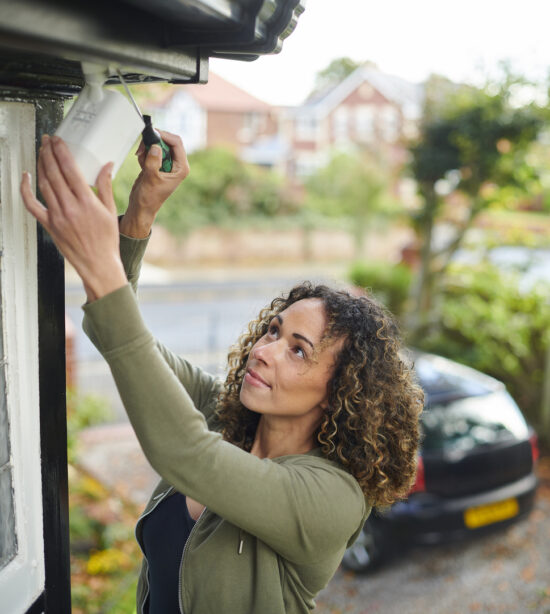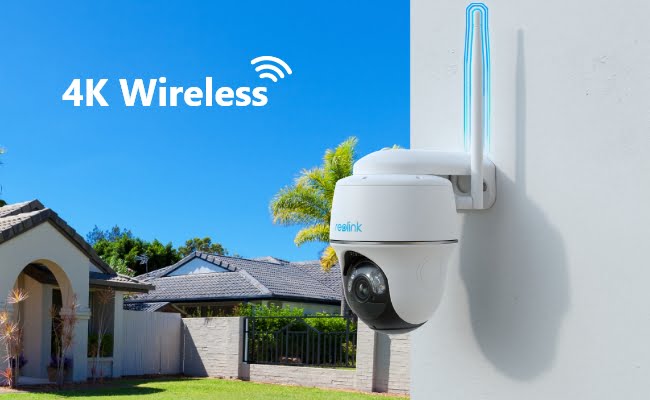- Pet Food Dispenser With Camera: The Ultimate Way to Monitor Your Pet’s Meals! - November 16, 2023
- Automatic Pet Feeder With Timer: A Time-Saving Solution for Busy Pet Owners - November 16, 2023
- Pet Tracker for Small Dogs: Discover the Ultimate Solution for Tracking Your Furry Friend - November 16, 2023
Home security cameras are devices that monitor and protect your home, available in both indoor and outdoor options. They should have features such as motion activation, good image quality, and the ability to store footage.
When buying and installing security cameras, it is important to consider the right features and follow the proper setup instructions. Some key features to look for include motion-activated recording, smartphone alerts, good-quality resolution, and night vision. Installing the cameras involves connecting them to power sources and adjusting them to the desired angle.
These cameras work by capturing and recording footage to enhance the security of your property.
Introduction To Home Security Cameras
Looking for information on home security cameras? Discover essential features, such as motion activation and image quality, to consider when purchasing. Learn how to install and set up your cameras for optimal security.
Overview Of The Importance Of Home Security Cameras
Home security cameras play a crucial role in safeguarding your property and providing you with peace of mind. With the increasing rate of burglaries and home invasions, it has become essential to invest in a reliable home security camera system. These cameras act as an effective deterrent for potential intruders, as the mere presence of a visible security camera can deter criminals from targeting your home. Moreover, in the unfortunate event of a break-in, security cameras can provide valuable evidence for law enforcement and increase the chances of apprehending the culprits. In addition to deterring burglars, home security cameras also allow you to monitor your property remotely, ensuring that your loved ones and belongings are safe even when you’re away.
Benefits Of Using Home Security Cameras
Enhanced Safety and Protection
- Better Surveillance: Home security cameras provide constant monitoring of your property, allowing you to keep an eye on vulnerable areas like entrances, driveways, and backyard.
- Quick Alerts: Modern security cameras are equipped with motion sensors that send instant alerts to your smartphone whenever any suspicious activity is detected, enabling you to take immediate action if necessary.
- Deterrence: The presence of visible security cameras acts as a deterrent, reducing the chances of break-ins and intrusions in the first place.
Valuable Evidence
- Crime Prevention: In the unfortunate event of a burglary or vandalism, security camera footage can provide valuable evidence to law enforcement, increasing the chances of apprehending the criminals.
- Insurance Claims: In case of property damage or theft, recorded video footage from security cameras can help expedite insurance claims and provide evidence to support your case.
Remote Monitoring and Peace of Mind
- 24/7 Surveillance: With remote access to your security camera system via smartphone or computer, you can monitor your home in real-time from anywhere and at any time. This gives you peace of mind, especially when you are traveling.
- Checking on Loved Ones: Home security cameras allow you to check on children, elderly parents, or pets when you are not physically present, ensuring their safety and well-being.
Investing in a reliable home security camera system offers multiple benefits, including enhanced safety, deterrence, valuable evidence, and remote monitoring. With technology advancements, these cameras now come equipped with advanced features such as high-resolution video quality, night vision, and motion detection. By choosing the right security camera system that suits your specific needs, you can significantly improve the security of your home and protect your loved ones and valued possessions.
Types Of Home Security Cameras
When it comes to choosing a home security camera, it’s important to understand the different types available on the market. In this section, we will discuss the two main categories of home security cameras: indoor and outdoor security cameras. Additionally, we will explore the options of wired and wireless security cameras, highlighting the features and benefits of each type.
Indoor Vs Outdoor Security Cameras
Indoor security cameras are designed to be installed inside the house and are suitable for monitoring the interior of your home. These cameras are typically smaller in size and can be discreetly placed in various locations, such as on a shelf or mounted on a wall. Indoor cameras are ideal for monitoring common areas, such as living rooms, kitchens, or bedrooms, and can help keep an eye on your valuable possessions and loved ones.
On the other hand, outdoor security cameras are specifically designed to withstand the elements and provide surveillance for the exterior of your home. These cameras are weatherproof and built with features like infrared night vision to ensure reliable performance day and night. Outdoor security cameras are ideal for monitoring the perimeter of your property, entrances, driveways, and other outdoor areas. They act as a deterrent to potential intruders and provide you with peace of mind knowing that your home is protected.
Wired Vs Wireless Security Cameras
When choosing a home security camera system, you’ll need to consider whether you want a wired or wireless setup. Here’s a breakdown of each type:
| Wired Security Cameras | Wireless Security Cameras |
|---|---|
| – Require physical cables for power and data transmission | – Powered by batteries or connected to a power source |
| – Offer a reliable and stable connection | – Provide flexibility in camera placement |
| – Tend to be more secure against hacking | – Can be vulnerable to signal interference |
| – Typically harder to install due to cable routing | – Easier to install, especially for DIY setups |
Both wired and wireless security cameras have their advantages depending on your specific needs and preferences. Wired cameras are known for their stability and are a reliable option for long-term surveillance. On the other hand, wireless cameras offer more flexibility when it comes to placement and are easier to install, making them a popular choice among homeowners.
No matter which type you choose, be sure to consider the specific features and benefits that each camera offers to ensure it meets your security requirements.
Key Features To Look For When Buying Home Security Cameras
When buying home security cameras, look for key features such as motion-activated recording, smartphone alerts, good-quality resolution, and night vision. These features will ensure that your property is kept secure and monitored effectively.
Motion-activated Recording
Motion-activated recording is an essential feature to consider when buying home security cameras. With this feature, the camera will start recording as soon as it detects any motion in its field of view. This ensures that you capture any potential intrusions or suspicious activity, even when you’re not at home. It saves storage space by only recording when necessary and allows you to review the footage later for any relevant events.
Smartphone Alerts
Another crucial feature to look for is smartphone alerts. With this capability, your security cameras can send real-time notifications to your smartphone whenever motion is detected or any other pre-set activity occurs. This enables you to stay informed about any potential threats to your property while you’re away. You can also view the live feed from your cameras or access recorded footage from anywhere using your smartphone, ensuring peace of mind and the ability to take immediate action if needed.
High-quality Resolution
When it comes to security cameras, image quality is paramount. You want to ensure that the footage captured is clear and detailed, allowing you to identify faces, license plates, or other important details accurately. Look for cameras with high-resolution capabilities, as this will ensure that you have reliable and clear evidence in the event of an incident. Grainy or blurry footage won’t be of much use when you need it the most.
Night Vision
Night vision is a vital feature for home security cameras as it allows for monitoring and surveillance in low-light or dark conditions. It uses infrared technology to capture clear footage even when there is minimal or no visible light. With night vision capabilities, your security cameras can continue to protect your property 24/7, regardless of the lighting conditions. This feature is especially crucial for outdoor cameras, where incidents are more likely to happen during nighttime.
In conclusion, when buying home security cameras, it’s essential to consider key features that ensure the safety and security of your property. Motion-activated recording enables you to capture relevant events, while smartphone alerts keep you informed and allow remote access to your cameras. High-quality resolution ensures clear and detailed footage, and night vision provides surveillance capabilities even in low-light environments. By focusing on these features, you can make an informed decision and choose the right cameras to protect your home.
Factors To Consider When Buying Home Security Cameras
When buying home security cameras, it’s important to consider factors such as motion activation, image quality, storage capacity, and essential features like smartphone alerts and night vision. These features will contribute to keeping your property secure and provide peace of mind.
When it comes to ensuring the safety of your home, investing in a reliable home security camera system is crucial. With numerous options available in the market, it can be overwhelming to choose the right one for your needs. To make your decision easier, here are some factors to consider:
Video Quality
The video quality of your home security camera is of utmost importance. After all, there’s no point in installing a camera if the footage is too grainy or blurry to identify details. Look for cameras that offer high-definition (HD) or even ultra-high-definition (UHD) video resolution. With crisp and clear video quality, you’ll have peace of mind knowing that you can accurately monitor any activity in and around your home.
Storage Options
Consider the storage options available with the home security camera system you’re considering. Most cameras offer cloud storage, allowing you to access and store video footage remotely. This ensures that even if the camera is tampered with, the footage remains safe and accessible. Alternatively, some cameras also offer local storage options, such as SD cards or hard drives, providing you with the flexibility to choose the storage method that suits your needs best.
Essential Features
When it comes to home security cameras, there are several essential features you should look out for. These features include motion-activated recording, smartphone alerts, good-quality resolution, and night vision capabilities. Motion-activated recording ensures that the camera starts recording as soon as any movement is detected, allowing you to capture any suspicious activity. Smartphone alerts enable you to receive real-time notifications on your mobile device, keeping you informed about any potential security breaches. Good-quality resolution ensures clear and detailed video footage, while night vision capabilities enable the camera to record even in low-light or dark conditions.
Pricing
Pricing is an important consideration when buying home security cameras. While it’s important not to compromise on quality, it’s also essential to find a system that fits within your budget. Compare the prices of different cameras and look for the best value for money. Keep in mind that it’s not just the initial purchase cost but also any additional subscription fees for cloud storage or any other ongoing costs that need to be taken into account.
By considering these factors – video quality, storage options, essential features, and pricing – you can make an informed decision when buying home security cameras. Remember to choose a system that aligns with your specific needs and provides you with the peace of mind you deserve.
Installation And Setup Of Home Security Cameras
When it comes to the installation and setup of home security cameras, it is important to know the key features to look for, such as motion-activated recording, smartphone alerts, good-quality resolution, and night vision. By following the necessary steps, you can effectively install your cameras and ensure the security of your property.
Installing Wi-fi Cameras With Batteries
- Start by placing the batteries into the camera. Ensure that the batteries are inserted correctly, following the instructions provided with the camera.
- Once the batteries are in place, download and install the camera’s accompanying mobile app on your smartphone or tablet.
- Open the app and create an account if necessary. Follow the prompts to connect the camera to your Wi-Fi network.
- Place the camera in the desired location, ensuring that it is within range of your Wi-Fi signal.
- Use the app to adjust the camera’s angle and settings to suit your needs. You can typically control features such as motion detection sensitivity, recording modes, and notifications.
- Repeat these steps for each Wi-Fi camera you have.
Tips For Camera Placement And Positioning
Proper camera placement and positioning are crucial for maximizing your home security. Here are some tips to consider:- Place cameras at all entry points, such as doors and windows, to capture any potential intruders.
- Ensure that the cameras have an unobstructed view of the areas you want to monitor.
- Position cameras at a height that allows for clear and comprehensive coverage.
- Avoid placing cameras in areas with excessive glare, as it can affect the quality of the footage.
- Consider using cameras with pan and tilt functionality to cover larger areas and reduce the number of cameras needed.
- Make sure to position cameras outdoors in weatherproof housings to protect them from the elements.

Credit: www.neighbor.com
Frequently Asked Questions On What To Know About Home Security Cameras
What Should I Look For When Buying A House Security Cameras?
When buying house security cameras, look for these key features: motion-activated recording, smartphone alerts, good-quality resolution, and night vision. These features will help keep your property secure. Make sure to install the cameras properly by following the instructions provided.
What Do I Need To Know About Setting Up A Home Security Camera?
To set up a home security camera, follow these steps:1. Install batteries for Wi-Fi cameras or connect the cable for wired cameras. 2. Attach the camera to a power source if needed. 3. Secure the camera onto the mount and adjust the angle.
4. Repeat the process for each camera location.
What Makes A Good Home Security Camera?
A good home security camera should have motion activation, clear image quality, smartphone alerts, night vision, and good-quality resolution. These features help keep your property secure.
Do Home Security Cameras Record All The Time?
Home security cameras do not record all the time. They typically only start recording when motion is detected. This helps save storage space and allows for easy reviewing of important footage.
What Are The Benefits Of Installing Home Security Cameras?
Installing home security cameras provides peace of mind, deters potential burglars, and allows you to monitor your property remotely.
Conclusion
To ensure your home is protected, it is essential to understand the important features of home security cameras. Look for cameras with high-quality image resolution, as grainy or blurry footage defeats the purpose of installing a camera. Motion activation is crucial, ensuring that the camera starts recording as soon as motion is detected.
Additionally, consider features such as storage options and essential functionalities that meet your security needs. By selecting the right home security camera, you can ensure the safety and security of your property.


